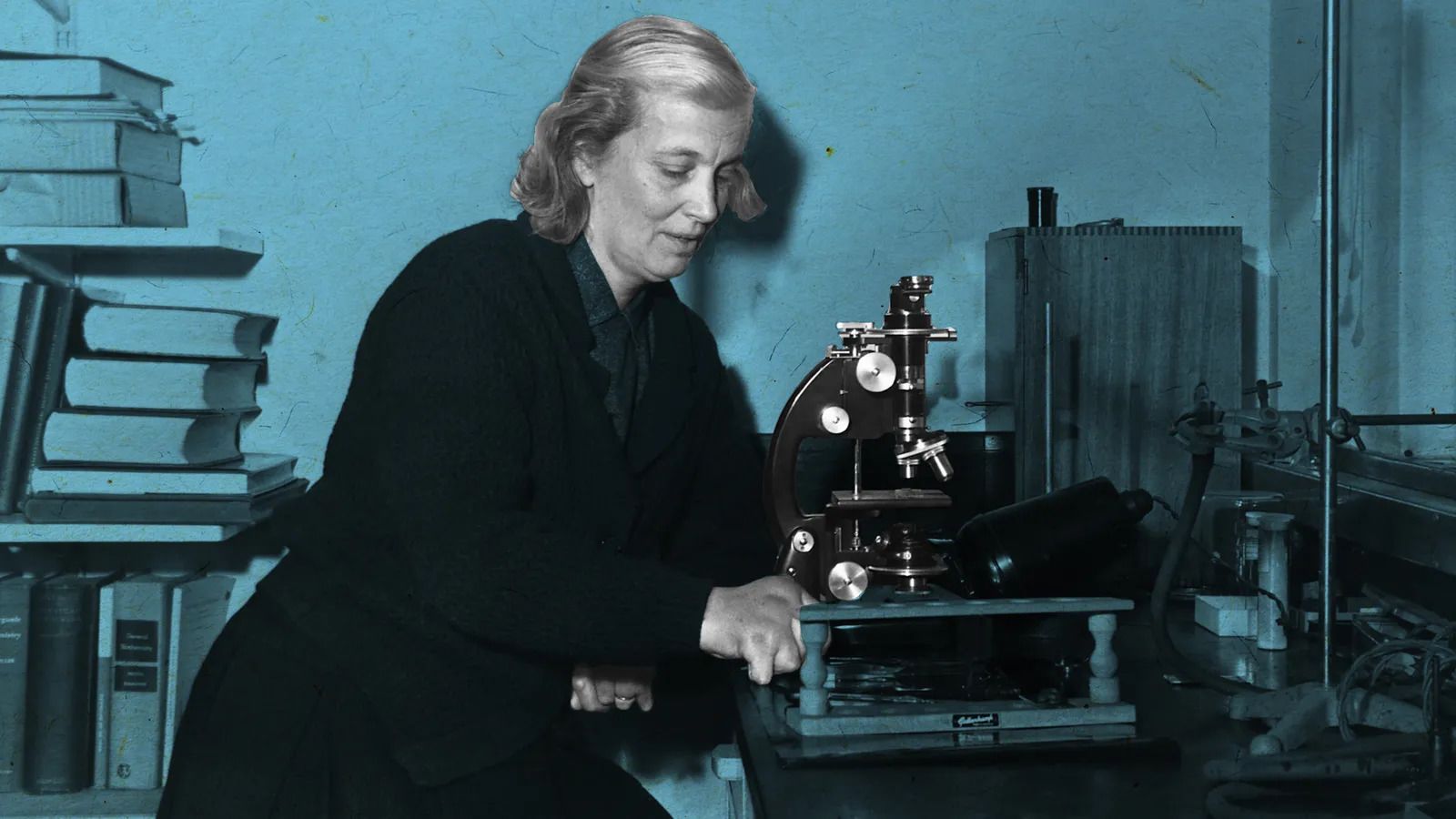
Why there's more to being smart than intelligence
In the late 1920s, a young working-class boy nicknamed Ritty spent most of his time tinkering in his "laboratory" at his parents' home in Rockaway, New York.
His lab was an old wooden packing box, equipped with shelves that contained a storage battery and an electric circuit of light bulbs, switches and resistors. One of his proudest inventions was a homemade burglar alarm that alerted him whenever his parents entered his room. He used a microscope to study the natural world and he would sometimes take his chemistry set into the street to perform tricks for other children.
Ritty's early academic record was unremarkable. He struggled with literature and foreign languages, while, in an IQ test taken as a child, he reportedly scored around 125, which is above average but by no means genius territory. As an adolescent, however, he showed a flair for mathematics and started teaching himself from elementary textbooks. By the end of high school, Ritty reached the top place in a state-wide annual maths competition.
The rest is history. You might know Ritty as the Nobel Prize-winning physicist Richard Feynman, whose new theory of quantum electrodynamics revolutionised the study of subatomic particles.
Other scientists found the workings of Feynman's mind to be unfathomable. To his peers, he appeared to have an almost supernatural talent, leading the Polish-American mathematician Mark Kac to declare in his autobiography that Feynman was not just an ordinary genius, but "a magician of the highest calibre".
Can modern psychology help us to decode that magic and to understand the makings of genius more generally?
Simply defining the term is a headache: there is no obvious objective criteria. But most definitions identify genius with exceptional achievement in at least one domain, with originality and flair that is recognised by other experts in the same discipline and which may spur many more advances.
Identifying the origins of genius, and the best means of cultivating it, has been an even harder task. Is it the product of a high general intelligence? Limitless curiosity? Grit and determination? Or is it the lucky combination of fortunate circumstances that are impossible to recreate artificially? Research on the lives of exceptional individuals – including studies of Nobel Prize winners such as Richard Feynman – can provide some clues.
The Termites
Let's begin with the Genetic Studies of Genius, a hugely ambitious project led by Lewis Terman, a psychologist based at the Stanford Graduate School of Education in the early 20th Century.
Terman was an early pioneer of the IQ test, translating and adapting a French measure of children's academic aptitude developed in the late 19th Century. The questions looked at a range of different abilities, such as vocabulary, mathematics and logical reasoning, which were, together, assumed to represent someone's capacity for learning and abstract thinking. Terman then created tables of the average scores for each year group – against which he could compare any child's results to identify their mental age. The IQ score was then calculated by dividing the mental age by the chronological age and multiplying this ratio by 100.
A 10-year-old who scored the same as the average 15-year-old would have an IQ of 150, for example. A 10-year-old who reasoned like a nine-year-old would have an IQ of 90.
 Jazz musician John Coltrane had wide-reaching interest in religious faiths
Jazz musician John Coltrane had wide-reaching interest in religious faiths
"There is nothing about an individual as important as an IQ," declared Terman in an article on the subject, and predicted that a child's score would predict great achievement in later life.
Beginning in the early 1920s, Terman started scouring California's schools for pupils with an IQ of at least 140, which he considered to be the threshold for genius. More than 1,000 children made the grade – a cohort that he and his colleagues would study for the next seven decades.
Many of these "Termites", as they were affectionately known, went on to have successful careers. There was Shelley Smith Mydans, for example – a war reporter and novelist, and Jess Oppenheimer, a producer and writer who became famous for his work with the comedian Lucille Ball. (She called him "the brains" behind her acclaimed hit series I Love Lucy.) By the time of Terman's death in the late 1950s, more than 30 had made it into the Who's Who in America – a book of influential people – and nearly 80 had been recognised in a reference book outlining the US's most prominent scientists, called American Men of Science. (Despite the name, women were eligible to be included, although the book's name did not reflect this fact until the 1970s.)
When you look carefully at the data, however, these statistics do not offer strong support for the idea that people with high IQs are destined for greatness. It's important to control for potentially confounding factors such as the socioeconomic circumstances of the Termites' families. Children with educated parents and more household resources tend to score better on IQ tests, and this privilege could, in turn, make it easier to have success later in life. Once this is taken into account, the Termites did not perform much more remarkably than any children of similar backgrounds.
Other studies looked at the IQ differences within the Terman group to see whether the top scorers were proportionately more likely to succeed than those who had only scraped in. They weren't. When David Henry Fieldman examined measures of professional distinction, such as a lawyer being made a judge, or an architect winning a prestigious award, the people with IQs of more than 180 were only slightly more successful than those scoring 30 to 40 points less. "High IQ does not seem to indicate 'genius' in the commonly understood sense of the word," he concluded.
It is telling that Terman's initial study had rejected two Californian boys – William Shockley and Walter Alvarez – who went go on to win Nobel Prizes for Physics, while none of the children who had made the grade would receive such an accolade.
Growing up in New York, Richard Feynman would have never had the chance to take part in the Genetic Studies of Genius, which took place in California. But even if he had been living near Stanford, where Terman was based, his alleged childhood IQ score of 125 would have meant that he would not have qualified either.
A multifaceted mind
The Termites' life stories should not undermine the usefulness of IQ as a scientific tool. Although it is far from perfect, we know that IQ scores are correlated with educational attainment and income across the population. It will certainly help someone to grasp abstract concepts that are important in many disciplines – particularly those in mathematics, the sciences, engineering, or philosophy.
But when it comes to predicting the extraordinary achievements that could be considered genius, it seems to be only a small part of the picture.
Consider the capacity to think originally and to contribute something of value to your discipline – a rather fundamental criteria for genius. Intelligence tests typically involve questions testing verbal and non-verbal reasoning, and they often have a single right answer. This doesn't seem to capture some important elements of creativity, such as divergent thinking, which is the ability to generate new ideas.
To measure overall creative achievement, psychologists have developed detailed questionnaires that ask people how often they engage in various creative activities – such as writing literary works, composing music, designing buildings, or proposing scientific theories. Crucially, they are then asked to list the recognition for these projects – whether, for example, their work has ever been awarded a prize and if they have attracted media coverage. Thousands of participants have now completed these questionnaires for multiple studies, and they all show that IQ is only modestly correlated with participants scores on these measures.
Given these findings, it seems likely that intelligence is a necessary, but not sufficient, condition for great creative achievements. If you have a higher IQ score then creative insights may be more likely. But your higher-than-average intelligence must be combined with a number of other traits to come up with something truly original and noteworthy. This would help to explain why the vast majority of the Termites did not make history in the way he had predicted. Despite having unusually high intelligence, they simply didn't have the other qualities that are necessary for genius.
 Could unquenchable curiosity be the spark that pushes someone towards being a genius?
Could unquenchable curiosity be the spark that pushes someone towards being a genius?
Our understanding of what those other essential traits might be is still evolving, but one important candidate is curiosity. Curiosity can be measured by questionnaires examining how much people enjoy exploring new ideas and trying new experiences, and they appear to be more creative in laboratory brainstorming tasks and in their personal lives.
The importance of curiosity for creative genius can also be seen in case studies of eminent figures. While it is not always possible to get these people to complete personality questionnaires themselves, researchers have asked biographers, familiar with the minutiae of their lives, to do so on their behalf. The biographers tended to score their subjects unusually highly on traits related to intellectual interest and exploration. For example, the 20th Century jazz musician John Coltrane was deeply fascinated in religious faiths, studying Christianity, Buddhism, Hinduism and Islam, many of the influences of which can be detected in his music.
Why would curiosity push someone towards genius? A hunger for knowledge should certainly motivate you to push the boundaries of limits within your own discipline, whereas others – with less of a need to know more – might just give up. Curiosity can also encourage someone to broaden their horizons beyond their specialism, which appears to bring its own benefits.
Nobel Prize-winning scientists, for example, list about three times as many personal hobbies as the average person – and they are particularly likely to engage in creative pursuits such as music, painting, or writing poetry. These pastimes may train the brain to generate and refine ideas, fuelling more original insights in the scientist's main discipline.
The mastery of different fields trains you to look at problems from multiple viewpoints, which makes original insight more likely
Pursuing multiple interests can also lead to a fortuitous cross-pollination of ideas. The chemist Dorothy Crowfoot Hodgkin, for instance, won a Nobel Prize for her advances in x-ray crystallography, which allowed her to uncover the structure of biochemicals such as penicillin and vitamin B12. From adolescence, however, she had an intense interest in Byzantine mosaics, and her knowledge of their symmetries and geometry apparently helped her to understanding how repeating patterns of molecules could be arranged in crystals, which was instrumental to her scientific research.
As Waqas Ahmed, author of The Polymath, puts it: "In order for you to make a novel contribution to any given field, you need to look at that field through the broadest possible lens and to draw in as many sources of inspiration as possible." The mastery of different fields trains you to look at problems from multiple viewpoints, which makes original insight more likely. He points to Maya Angelou – the poet, journalist, actor, filmmaker, and civil rights activist who also enjoyed work as a dancer and singer – as a modern example of a polymath whose multiple interests offered much more than the sum of their parts and together fuelled her astonishing creativity.
The life of Richard Feynman certainly fits these trends. Think of all that time in childhood that he spent tinkering in his laboratory, pursuing different projects in multiple disciplines. And as an adult, he taught himself to draw, play the bongos, speak Portuguese and Japanese, and read hieroglyphs, and even embarked on a side project in genetics.
One day, in the university cafeteria, he happened to notice a man throwing plates and catching them. He noticed that they wobbled as they moved and started sketching out equations to describe their motion. He soon saw parallels with the activity of electrons in orbit around the atom – an insight that led to his Nobel Prize-winning work on quantum electrodynamics.
From this scientific and anecdotal evidence, it might be easy to conclude that intelligence combined with curiosity is the winning formula for genius. But of course, that's not true either – there will be many more pieces to the puzzle.
 Nobel Prize winner Dorothy Crowfoot Hodgkin drew on her interest in Byzantine mosaics in her research on biochemicals
Nobel Prize winner Dorothy Crowfoot Hodgkin drew on her interest in Byzantine mosaics in her research on biochemicals
There is grit, for instance – a dogged pursuit of your passions even when you face setbacks. Any genius, in any discipline, must first master a huge amount of knowledge and skill before they can make their own breakthrough, and that typically comes with years of practice. Angela Duckworth, a professor of psychology at the University of Pennsylvania, has pioneered research on grit, and her findings suggest that, like IQ and curiosity, it contributes to various measures of success.
Geniuses will also employ "metacognitive strategies" – which describes all the processes that we use to plan our projects, monitor our progress and find better, more efficient strategies to do what we need to do. Without this useful reflection on our work, we may find ourselves wasting time that could have been better spent in fruitful practice or exploration. This may sound obvious, but some people struggle to think strategically so that they can make the most of their efforts – and that's going to make it much harder to reach a high level of achievement.
Finally, there's intellectual humility – a neglected but fundamental trait. Recent research by Tenelle Porter at Ball State University in Muncie, Indiana, shows that a capacity to acknowledge your flaws and limitations boosts learning – since it encourages you to tackle your errors head on and fill in the gaps in your thinking. In the long-term, that will contribute to greater growth in any discipline. Feynman appears to have recognised this. "I can live with doubt and uncertainty and not knowing. I think it's much more interesting to live not knowing than to have answers which might be wrong," he said in a TV interview.
Even if someone has all these positive traits, luck undoubtedly plays a large part in determining who will and won't rise above their peers. You need to be in the right place, at the right time, surrounded by the right people, to be able to make the most of your talents – and even the most promising individuals could easily miss the opportunities to shine. It's not hard to imagine a brilliant scientist who was unfairly rejected for a place in a lab that might have offered the perfect nurturing environment to cultivate their abilities; or an artist who missed all the social connections to be exhibited prominently.
That's not to mention the structural barriers – associated with race, gender, or sexuality – preventing many brilliant minds from reaching their potential and the recognition that they deserve. As Virginia Woolf noted in A Room of One's Own, the basic requirements for creativity, such as the time and privacy to work, had been – and still are – denied to large segments of the population. The role of good fortune in achievement offers another good reason for successful people to maintain their humility, even after they have started to gain recognition for their accomplishments.
The humble genius
Sadly, many people take a rose-tinted view of their path to their recognition as a genius. They begin to believe that their exceptional minds guaranteed success and that their judgements are infallible – a loss of humility often comes to tarnish their reputation.
Science writers have long noted the existence of "Nobel Disease" – a tongue-in-cheek term that is used to describe the tendency of some Nobel winners to form rather irrational theories later in life. Multiple scientists who stood on Stockholm City Hall's podium to accept the pinnacle of recognition in their discipline have gone on to express absurd justifications for Aids denialism, climate denialism, vaccine denialism, scientific racism, and the endorsement of pseudoscientific treatments such as homeopathy.
Socrates, of course, taught us about this millennia ago. In Apology, Plato describes how his teacher wandered the streets of Athens to meet the city's most successful poets, artisans and politicians. Eventually, he recognised that the wisest people were those who could acknowledge the limits of their knowledge.
The lesson is as relevant for would-be geniuses today as it was 2,400 years ago. No matter how great your talents, there will always be something you do not know.











